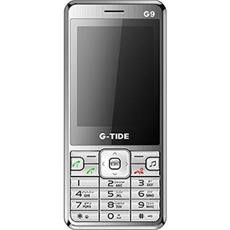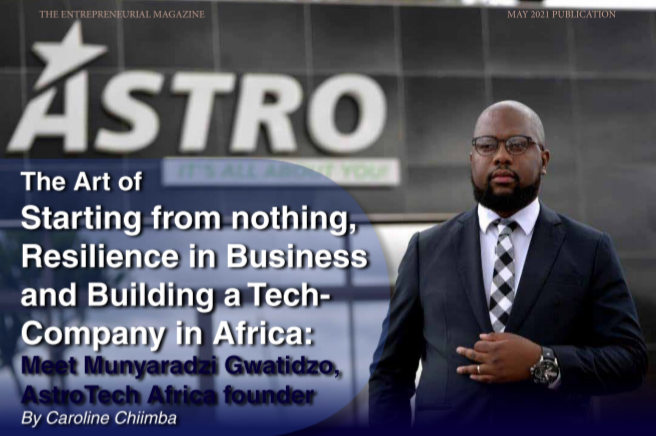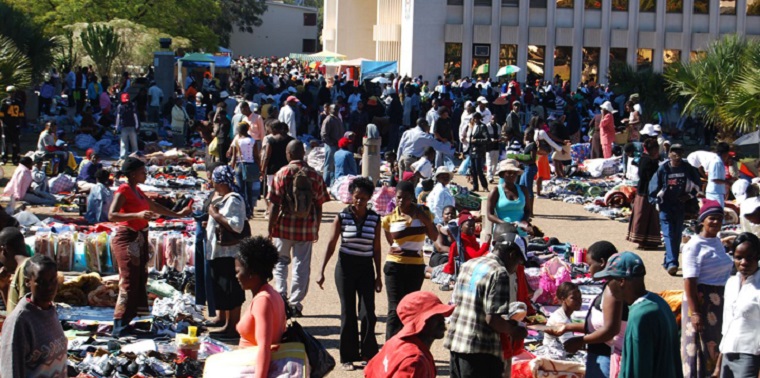IF you can’t bear to have your face stepped on, don’t try to climb the ladder.
Munyaradzi Gwatidzo, a 38-year-old tech-entrepreneur’s five-year journey to a breakthrough reads out like that of a scene in a movie script, only that his is a real-life story.
Born and raised in Mbare, Harare and orphaned at a young age, Gwatidzo was deprived of a chance to attend University to pursue studies in technology due to financial constraints as he hailed from an underprivileged family. However, his passion for technology was never denied, it was just delayed.
While working as a filing clerk at FBC Bank at the age of 20, he found himself doing a side job of buying and selling second hand phones after a friend of his persuaded him that the deal has good returns.
“A friend of mine (Blessed) approached me and told me that there was an opportunity to sell second hand phones in Zambia with good returns. We tried it, bought some dead phones, repaired them and sold them in Zambia,” Gwatidzo told the Entrepreneurial Magazine.
“Friday after work we would board a bus to Zambia, spend the whole of Saturday selling phones and came back to Zimbabwe in an overnight bus. Monday by 5am would be back in Harare and then prepare myself for work. It then became my life.
“While at work at the bank, I also realised the majority of people could not afford buying phones, I thought of how we can make it easy and cheaper for them. People where still using cheques then, so I could sell phones to colleagues on credit,”
The side business which started from buying and selling two old cellphones started growing as Gwatidzo got an opportunity of buying old phones from the UK and selling them in Zambia and Zimbabwe. The then 20-year-old resigned from the bank and opened a small shop in Chitungwiza selling LG phones.
“I also met another friend who introduced me to Dubai phones, so I started to purchase phones from Dubai also. However, re-selling other brands was not enough for me. I had a long-term vision of having my own cell phone brand. A brand that is going to be affordable and enable millions of Africans to have access to mobile smart phones because I had felt that cell phones were going to be the key driver of socio-economic development in Africa,” Gwatidzo said.
“I realised that a cell phone will one day not be a luxury, but a gadget to leverage on technology like what we are seeing now, how cell phones have transformed financial services, educational sector, agriculture and even the entertainment sector. But the limiting factor was affordability.”
The introduction of G-Tide

Gwatidzo started doing his research around mobile phones, and with China being the highest manufacturer of affordable phones, it became the first point of call for the young self-driven entrepreneur.
Following various virtual communications with people in China, Gwatidzo decided to throw caution to the wind and used his savings to travel to China for negotiations. Upon arrival, he navigated China faced with language barrier challenges but at the end he managed to meet with the company that had invited him.
“I met the company, told them about my vision and they laughed because I was still very young (22) and didn’t have money. I just had an idea I strongly believed in, of having low cost phones in Africa,” he said.
“They asked how much I had but I didn’t have any meaningful amount. That’s when they told me that l needed at least 10 000 phones for them to be able to do a run for one model. I failed to convince them because I didn’t have much money and all the money I had saved, went into the trip to China and l came back with nothing.
“It was then difficult for me but after some months of continuous negotiations with these guys they finally yielded and called me back to China. I went back to China spoke to the company and told them we can start making this brand together and sell it in Africa.”
That was the first step for the G-Tide brand in Zimbabwe and it was around 2008. Gwatidzo started selling the phones locally but the stock was kept in China until he had to look for a partner here in Zimbabwe who had more capital to invest.
He found a co-partner for G-Tide and had the capacity to bring in more phones and they were selling thousands of devices. They grew the G-Tide, marketed it and we reached an extent of surpassing Nokia at some point in terms of market share in Zimbabwe when the economy started looking up again in 2009. Android phones became very popular.
“But still very young, having put so much, had differences with the local partner in terms of that. Obviously as someone who had more money, wanted more control in the company. He ended up partnering with the Chinese and eventually I felt cheated in the transaction and had to leave the company that I had started,” said Gwatidzo.
Coming in of G-Mobile
“I was angry and bitter, so went l on and started another company, G-Mobile, did not want to leave the G out of it because my last name started with G (Gwatidzo Mobile).
“When I left G-Tide, l left with nothing, they did not pay me anything in terms of shares or the work I had put. I started G-Mobile with nothing and this time had to go solo. I got a loan from a local loan shark and the business grew and even did better more than G-Tide in terms of device financing.”
However, all the fruits of his hard work went to waste as the loan sharks kept on coming back for more money claiming its interest money and hyperinflation on the other side dealt a heavy blow to the business. Gwatidzo had not read the contract with the loan shark carefully and that cost him badly.The company started to crumble until Gwatidzo secured a loan from a bank to recapitalise the business.
“We restocked phones worth an approximate of USD$2 million (resale price). The loan sharks managed to get a summary judgement, I do not know how, because we were never part of it, and got a writ of execution, which they then kept,” he said
“When we restocked, the following day the deputy sheriff came and took stock close to USD$2million dollars for a US$100 000 dispute. We tried to fight the issue, stock was hold for a year and we eventually lost that again.
“I lost my cars, friends and almost everything. I was down and people started laughing at me. I was 25 years by then. I was reduced from a seven bedroomed, double storey house and went to stay in a flat with my cousins, sleeping in the dining room with my family.
I faced many difficulties, but had to restart again.
The coming to being of Astro Technology


The collapse of G-Mobile meant Gwatidzo had to start from zero again. A friend of his offered him an office in Newlands and he used to walk on foot daily from CBD to Newlands. He tried to put in some business plans together and search for funders in Zimbabwe with no success.
“During that time I managed to get access to our computer which was bought at the deputy sheriff auction and it had a lot of our information on debtors. We then followed up on that information and managed to recover some money from debtors.
“I utilised the money to go to New York and met with other business people there. I met Nigel Chanakira, who was still running the Kingdom Bank, and shared mu story with some entrepreneurs there but still came back with nothing. I was demotivated, but I had learnt lot in terms of business.”
After returning home empty handed, Gwatidzo kept in touch with Mr Chanakira and kept on selling his vision to him until Mr Chanakira offered to mentor him first. After 6 months, a breakthrough came and through for Gwatidzo as Mr Chanakira got an investment. Gwatidzo started the AstroTech Company.
“This time around told my team that we were going to build a brand that was going to shine in the whole of Africa. Could not find a better name for the company besides Astro. Astro means the brightest star in the sky and through the investment from Mr Chanakira, that’s how Astro was reborn,” Gwatidzo said proudly.
“We expanded it from a team of 5 people, to a team of 2000 people in Zimbabwe. I always tell people that if you want to do business, go through SMI, it helped me to grow, it’s worth every dollar you will spent on it.”
AstroTech Africa is now an Afrocentric Technology and device manufacturing company providing innovative technological solutions which are designed for the needs of the African consumer. Astro is a rapidly expanding e-commerce company with branches in Zimbabwe, Zambia, Malawi, Tanzania and South Africa.
“First thing is coming up with prototype designs. We then approach ODMS; these are companies that makes manufacturing of phones much easier. Once we agree on prototype, they negotiate with suppliers of all major equipment. They are sought of project managers,” Gwatidzo narrated the process to the Entrepreneurial Magazine.
“After testing the prototype, we get assembling companies that will then assemble the phones. So now, instead of sending the sourced equipment to china, we will now be assembling the phones here in Zimbabwe then export throughout the region.”
Currently, the Company boosts of three subsidiaries including Astro mobile, E-Shagi and Pulse. Astro mobile manufactures mobile phones, smart phones and smart TVs while E-Shagi is a digital consumer-financing platform. Through e-shagi, users have access to credit through different digital platforms; the website, application, SMS and WhatsApp without any need for paperwork.
It leverages on Artificial Intelligence, Big Data and Machine Learning as a way of creating efficiency, convenience and financial inclusion to those people currently excluded in the system because they do not have the necessary paper work and formal ways of doing that.
“We are also financing different products and companies so that users can buy their products on credit and we pay them upfront,” Gwatidzo added.
Pulse is a digital healthy and wellness platform. It encourages and incentivised people to live healthy. The application pays you to exercise and you may redeem your points later on. The company is also looking toward helping artists earn from their talent and disrupting the educational and agricultural industry.
“In the next 3 years, we are seeing Astro Technology being the biggest Pan-African technology company in Africa. We are looking towards expanding into 25 countries in the next 3 years,” the 38-year-old father of three said hopefully.
“We have also managed to successfully set up an assembly line for mobile phones in Zimbabwe in partnership with the Arena Institute of technology.
“The advice I can give to rising entrepreneurs out there is that understand your vision and be stubborn in giving it life. Your company should be centred on solving problems. We need to be inventors and creators of solutions to the problems that our community is facing. You also need to create a unique vale proposition that will inspire people to want to use your product.”
Gwatidzo reiterated the need for running one’s business professionally and creating good structures.
“Invest in building a great team, for the success of the company lies in a competitive team. Get mentorship, getting mentorship through the SMI Programme made me what I am today. Network with people, you need to invest time in meeting new people through seminars and exhibitions.”
The AstroTech Africa founder’s journey from rags to riches to rags then to success again truly attest to Arnold Schwarzenegger’s saying that, ‘YouCan’t climb the ladder of success with your hands in your pockets.’ The road to success is always under construction.








